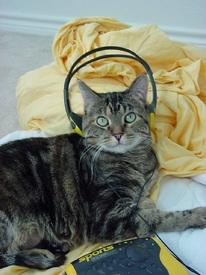Running VO2max of 44? Really??

Ms_J1
Posts: 253 Member
I'm 45 years old and I've only been running since about late August. About two weeks ago, I got a Garmin Forerunner 920XT w/HRM (and love it, by the way!) and it has calculated my running VO2max at 44 ml/kg/min which puts me in the "Superior" aerobic fitness category. Is this even possible for someone my age who has only been running 3-5 days a week (30-60 minutes per run) for the last 5 months?
0
Replies
-
It's just a guess. Real vo2 max tests involve more than looking at your runs & HRs0
-
I found the automatic test my Polar FT40 did was pretty far off. This was my result, but my real V02MAX is probably in the 45-47 range based on my race results.
 0
0 -
The_Enginerd wrote: »I found the automatic test my Polar FT40 did was pretty far off. This was my result, but my real V02MAX is probably in the 45-47 range based on my race results.

Rally, you're hairy but your gf has nice gams =P
0 -
Now I want a watch that tells me I'm elite all the time.
 0
0 -
The estimates of VO2Max from a Garmin are table-based with speed, distance, HR and HR-V (Heart Rate Variability) as inputs. They are just estimates and may be significantly off from the real numbers that a laboratory test would provide.
I use those types of numbers as strictly a relative guide. I track my VO2Max with my Garmin 620, and I started at 39 when I first got the watch this past summer. As I improved with my marathon training plan, I saw the number climb as high as 42... before starting to drop back. I realized after my marathon didn't go as planned, that I had overtrained and the drop in my VO2Max was a very strong indicator of that.
The best way to use this type of measure is just to benchmark if you are improving or declining.
Having said that, my understanding of VO2Max is that it is a measure that can only be improved within a limited range for any individual... that much of your VO2Max is determined by genetics and no amount of training is likely to move someone who is genetically "average" or "below average" into the "superior" category. Some small improvement is possible - and with enough time and training, even some significant changes can occur, but nothing earth shattering.
If you are interested in the science, I'd recommend checking out the Nova episode called "Marathon Challenge"... they go into some detail about VO2Max. Definitely worth the viewing... it should be available online to stream for free.
0 -
The study that Garmin bases it on is slightly older than one Polar bases their self-test on, and was not quite as accurate.
And both are actually a decent estimate up to a certain point, then they start to break down.
The Garmin used to use self-selected activity level, but now they base it on history. Which can be very off if you don't use the Garmin for everything. They may use something else for daily activity trackers with HRM option.
Polar is self-selected. Well, I don't know on the daily activity trackers with HRM included. And then uses your resting HR, perhaps some HRV that they tweaked the formula with.
The spreadsheet on my profile page - the HRM tab shows the method Polar uses along with study it comes from, with comments there as to when it breaks down.
The Garmin tab shows the study and method they use, though more hidden now without user selection.
I think you have reached that upper limit where it breaks down - which also means you likely have done well.
Because treadmill running is the most tested cardiovascular workout there is, and very reliable formula's have been the result regarding calorie burn and VO2 required for different masses and paces.
http://www.exrx.net/Calculators/WalkRunMETs.html
My only problem with the use of some of those formulas has been when some sites will predict what your pace should be in a race. And despite using my VO2max test results - there is no way I could run that fast for that long.
Oh, my VO2max is 60-62 depending on training being done, and the Polar estimates 49, and Garmin estimates 45.
And yes, you can improve a big jump at first, but then slow going afterwards, with very specific workouts to get much more improvement.
At some point, less weight will increase it more than the workouts will.
So if you've lost weight, it's correctly gone up for that reason too.0 -
Yes.I'm 45 years old and I've only been running since about late August. About two weeks ago, I got a Garmin Forerunner 920XT w/HRM (and love it, by the way!) and it has calculated my running VO2max at 44 ml/kg/min which puts me in the "Superior" aerobic fitness category. Is this even possible for someone my age who has only been running 3-5 days a week (30-60 minutes per run) for the last 5 months?
VO2max varies from one person to another for a handful of reasons the biggest being genetics followed up by training. Unless you have data that conflicts with what you're getting from the Garmin, I don't know of a reason not to accept the data from the Garmin.
Garmin uses technology from FirstBeat, a software company in Finland. I don't know if they've licensed it for their entire line of HRM's but it's used in the 610/620 and the 910/920. One of the values that it generates is a VO2max estimate as well as TE and Recovery time.
Can VO2max be increased? Yes.
Runners who run only "LSD" rarely see a change in VO2max but running only LSD is not a common training approach these days.
New runners and runners who train at high intensities may see their VO2max increase significantly (I don't have a book handy to cite a %).
After the worst training year since I started running in 2011 (actually "worst training 6 months") my VO2 max is down in the mid-40's but I expect that to increase over the next 6 months to about 50. I expect to get to that level because I've hit that level before - about a year ago I was using the FIRST training approach and my VO2max went from 46.6 to 50 in about 6 weeks.
I've only had my VO2max tested on a treadmill once. Now I use the .FIT file from my 620 in FirstBeat Athlete software.
Since you have the 920, your HRM can capture heart beats at a very high level of accuracy (you have to "tweak" the 920 to get it go into "R-R" recording mode) and then FirstBeat Athlete can read and analyze the file.
Let me know if you're interested in this and I'll send you additional info about R-R and FBA.
0 -
Yes.I'm 45 years old and I've only been running since about late August. About two weeks ago, I got a Garmin Forerunner 920XT w/HRM (and love it, by the way!) and it has calculated my running VO2max at 44 ml/kg/min which puts me in the "Superior" aerobic fitness category. Is this even possible for someone my age who has only been running 3-5 days a week (30-60 minutes per run) for the last 5 months?
VO2max varies from one person to another for a handful of reasons the biggest being genetics followed up by training. Unless you have data that conflicts with what you're getting from the Garmin, I don't know of a reason not to accept the data from the Garmin.
Garmin uses technology from FirstBeat, a software company in Finland. I don't know if they've licensed it for their entire line of HRM's but it's used in the 610/620 and the 910/920. One of the values that it generates is a VO2max estimate as well as TE and Recovery time.
Can VO2max be increased? Yes.
Runners who run only "LSD" rarely see a change in VO2max but running only LSD is not a common training approach these days.
New runners and runners who train at high intensities may see their VO2max increase significantly (I don't have a book handy to cite a %).
After the worst training year since I started running in 2011 (actually "worst training 6 months") my VO2 max is down in the mid-40's but I expect that to increase over the next 6 months to about 50. I expect to get to that level because I've hit that level before - about a year ago I was using the FIRST training approach and my VO2max went from 46.6 to 50 in about 6 weeks.
I've only had my VO2max tested on a treadmill once. Now I use the .FIT file from my 620 in FirstBeat Athlete software.
Since you have the 920, your HRM can capture heart beats at a very high level of accuracy (you have to "tweak" the 920 to get it go into "R-R" recording mode) and then FirstBeat Athlete can read and analyze the file.
Let me know if you're interested in this and I'll send you additional info about R-R and FBA.
How can I do this? I also have the 920 although my VO2 max is average, which doesn't surprise me.
0 -
I'm also interested in this......have a 920....it thinks my VO2 is 60 which is probably too high given my PB's.......0
This discussion has been closed.








